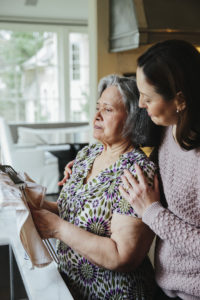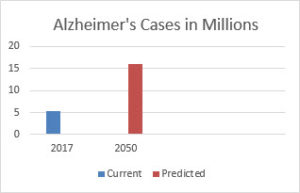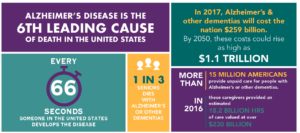Her Mind Went Traveling
January 11, 2018 • community
School of Public Health & Texas Center for Health Disparities
Community Blog
 The North Central Texas Chapter of the Alzheimer’s Association supports caregivers, families and individuals whose lives have changed due to dementia or Alzheimer’s. One caregiver, Laura, used to write poetry with her mother, and has shared her family’s journey with the Alzheimer’s Association.
The North Central Texas Chapter of the Alzheimer’s Association supports caregivers, families and individuals whose lives have changed due to dementia or Alzheimer’s. One caregiver, Laura, used to write poetry with her mother, and has shared her family’s journey with the Alzheimer’s Association.
This is just one of the heartbreaking stories on the Alzheimer’s Association’s website.
January is Alzheimer’s Disease Awareness Month. The Alzheimer’s Association encourages the community to gain knowledge and insight about this devastating disease and get involved with their mission to help end the disease.
The number of people with Alzheimer’s has soared to nearly 5.4 million and is expected to grow to 16 million by 2050 with the increasing age of baby boomers. If you notice any of the 10 Warning Signs of Alzheimer’s in yourself or someone you know, don’t ignore them. With early detection, people can explore treatments that may provide some relief of symptoms, maximize benefits of treatment and help maintain a level of independence longer.
A diagnosis of Alzheimer’s allows your loved ones the time to take part in decisions about care, transportation, living options, financial and legal matters. They can also participate in building the right care team and social support network. Care and support services available can help make it easier for you and your family to live the best life possible with Alzheimer’s or dementia.
To empower the community, the Association is hosting their 15th annual spring symposium, Dementia: Current Trends and Future Directions, Thursday, March 22 from 8:30 a.m. to 4:00 p.m. at the Arlington Convention Center.
The symposium offers CMEs, CNEs and continuing education with the goal of providing timely information regarding dementia care. There is no charge for family caregivers to attend. For more info and to register for the event, please visit ce.unthsc.edu/live/2831.
Get involved this month, and help raise awareness for Alzheimer’s disease then, attend the spring symposium March 22!
Contributors:
The Alzheimer’s Association North Central Texas Chapter
Teresa Wagner, DrPH, MS, CPH, RD/LD
Research reported in this publication was supported by the National Institute On Minority Health And Health Disparities of the National Institutes of Health under Award Number U54MD006882. The content is solely the responsibility of the authors and does not necessarily represent the official views of the National Institutes of Health.



Social media